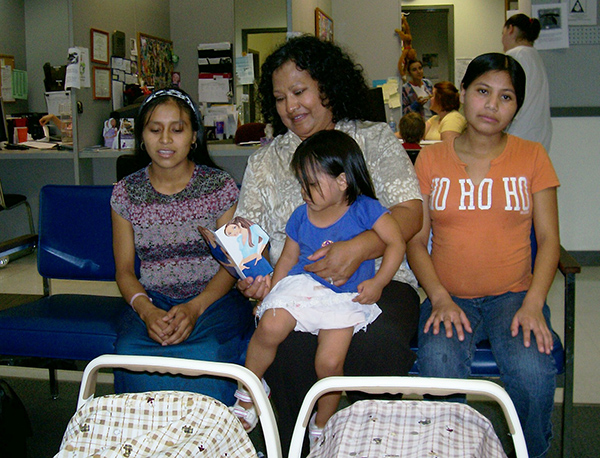A Mom Takes Strides to Close the Literacy Gap
Print This Post
BY DIANA ST. LIFER
Maria Lara not only believes amazing things can happen when you seize opportunities, she’s living proof. She and her four children, all under age 11, came to the United States from Mexico in 1994. Lara was 34 years old and couldn’t speak a word of English, but she was determined to assimilate to the culture for the benefit of herself and young children.
Within a year Lara was enrolled in English-as-a-Second-Language (ESL) classes at the Polk Family Center. She walked six miles every day to the Center with her 2-year-old son by her side or in her arms. Lara’s husband, who had been working in America for more than a decade when his family emigrated from Mexico, did not initially support his wife’s lofty goal to learn the language and go to school. “He was not happy,” she said, “But I wanted to understand what people were saying.”
Lara earned a GED (General Education Development) diploma in 2003, and today she is a translator at Cedartown’s Northside Elementary School. About 15 percent of the Polk County population is Hispanic and nearly 90 percent of that population resides in Cedartown.
The Polk Family Center, she says, gave her an opportunity that improved life for her and her children. “It helped my children a lot that I could understand and talk with their teachers and help them with their homework,” she said. Her persistence paid off and each child successfully graduated from high school. Her daughter’s graduation was particularly momentous because it was the same day Lara received the diploma she worked three years to obtain. “My daughter laughed and made jokes when I told her that I was going to graduate the same year,” Lara said. “She said it would be hard for me, but I did it.”
Lara credits the support she received from the Polk Family Center for her accomplishments. “I remember failing one part of the exam in the beginning and I wanted to quit,” she recalled. “My teacher called and said, ‘No, you are coming back.’ We cried together and she told me all the time that I was smart and that I could do it. So I took the test again and passed.”
Lara said she wishes other parents would take advantage of programs that will help them become more involved and participate in their children’s education. “I encourage other parents to go to school and learn English,” she said. “I know there are students who say they wish their parents could speak the language. The opportunities are there.”
The road, she warns, may not be easy but she is proof that the fairy tale ending is possible.
“I remember her saying that she felt like Cinderella because all her dreams had come true,” said Rhonda Heuer, coordinator of the Polk County collaborative who witnessed Lara’s journey. “She worked hard to realize those dreams. She set her sights on making things better for herself and her children, and with perseverance she did it.”
Diana St. Lifer is a professional writer with more than 25 years’ experience. She holds a bachelor’s degree in communications, a post-B.A. certificate in child advocacy, and is a certified professional life coach who specializes in teen and adolescent issues.
Countless studies have shown that reading proficiency by third grade is the most significant predictor of high-school graduation and career success. Not one of the most—the most. It is at this crucial juncture in elementary school when a child transitions from learning to read to reading to learn, and if the student isn’t reading on grade level before entering the fourth grade, the consequences can be long term and significant. In Georgia, that translates to nearly 70 percent of students who are at risk of failing or dropping out of school.
Read “Polk County Takes on Grade Level Reading Challenge with Multi-Faceted Strategy.”
Low birthweight, childhood obesity, and a literacy gap are serious threats to the well-being of Georgia’s families and children. Recognizing the impact these pressing issues have on the state’s health, safety, and ability to prosper, Georgia Family Connection Partnership has launched three initiatives dedicated to developing and implementing strategies that address these key indicators.
Read “Eleven Family Connection Collaboratives Team Up to Tackle Key Indicators of Child and Family Well-Being.”
